LITTER LOUTS
What can be done?
by TurfPro Editor, Laurence Gale MSC, MBPR
As well as taking a look at the latest covid guidelines for our sector, I consider what can be done about the terrible spate of littering we have seen in our parks and green spaces.
This week’s blog begins with a round-up of the latest Covid -19 rules and how their relate to our sector.
Guidelines for grounds
The government has finally declared it is safe for cricket to resume at the grassroots levels. A successful campaign has been run by Telegraph Sport to bring back club cricket that scored a resounding victory on Friday when Boris Johnson gave the go-ahead for 11-a-side matches to return next weekend.
The Prime Minister made an about-turn after provoking a furious backlash from the England & Wales Cricket Board and the club game that an imminent return was not possible.
He later however backtracked at his daily press conference saying, “I’ve sought scientific advice and the medical opinion of the third umpire has been invoked”, before going on to say cricket can return from July 11.

This is also in line with the recent government guidelines seen here.
These say, “You can now exercise alone, with members of your household, or with up to 5 other people from outside your household. From 4 July, up to two households are permitted to gather in groups of more than 6 people indoors or outdoors, provided members of different households can follow social distancing guidelines. Otherwise, gatherings of more than 6 people indoors or outdoors continue not to be permitted, unless this is essential for work purposes.
“Social distancing guidelines should be followed between people from different households wherever possible. From 4 July, this means a distance of 2m between people from different households, or 1m plus mitigations (such as face coverings or avoiding face-to-face contact) where 2m is not possible.
“Outdoor sports courts and other outdoor sporting activities have been permitted to reopen if those responsible for them are ready to do so and they can do so safely, following COVID-19 Secure guidelines."
“From 4 July outdoor gyms and playgrounds can open, as can clubhouse bars and restaurants. Indoor facilities should be kept closed, apart from toilets and throughways. Outdoor and indoor swimming pools will also remain closed to the public.”

The latest Football Association guidelines on the return of football activities can be seen here.
As for professional rugby, the RFU have announced a stage two return to club rugby activity. English Premiership rugby clubs will be allowed to return to contact training today 6th July ahead of a planned resumption of the 2019/20 season in August, officials have announced.
As for Bowls, Bowls England have announced their latest Covid-19 guidance. They say, “We welcome the further easing of restrictions that the Government has announced, particularly with regard to bars and restaurants, which will enable more of our clubs and members to enjoy a game of bowls over the coming weeks and generate much-needed income.”

It seems golf clubs are busy getting back up to speed with more people wanting to get into playing the game. Specialist machinery dealers have reported renewed interest in golf clubs wanting to invest in new machinery. This was evident from recent discussions my colleague Steve Gibbs editor of Service Dealer has been having with machinery dealers up and down the country who have been focusing on recovery.
Littering
Moving on to a different subject, I read with interest and horror Paul Rabbits' recent article on the current state of public parks and the disgusting behaviour of a number of people who have left the parks in a dreadful state. I, like most citizens, am completely bewildered with this poor and inappropriate behaviour from some people.
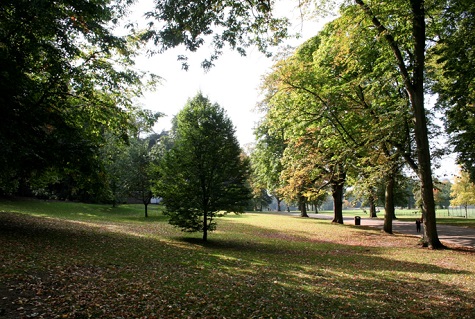
Yes, we do have to take into account there may not be enough bins or they are not being emptied as efficiently as they may have been prior to Covid-19. So a number of bins overflowing may be expected. However, how can we condone the actions of many who just simply leave their litter and debris on the ground and expect others to clear it up after them? They bring it with them, so why do they not take it home?
There is no legal definition of litter, but it includes anything from crisps to takeaway cartons to discarded bags of rubbish and dog waste. Keep Britain Tidy says that even apple cores and banana skins should be taken home for food waste recycling. Fly-tipping, including larger, white goods such as refrigerators and toasters, is defined as the illegal deposit of waste on land, contrary to Section 33(1)(a) of the Environmental Protection Act 1990.
Some interesting litter statistics as described by Countryfile magazine:
- 226 million cigarette butts are discarded in England every year
- £1 billion – the estimated cost of picking up litter in Britain in 2015
- 11,212 bottles and cans were collected in 2018’s month-long CPRE Green Clean Campaign
- 2.25 million pieces of litter are dropped on the streets every day [source: Symphony Environmental].
- 180,000 sacks of litter are cleared from motorways and major A roads each year by Highways England.
- £2.3 million is spend by Network Rail annually to clear fly tipping from its land.
Royal Parks state that one in five visitors to London’s Royal Parks leave their litter on the ground contributing to more than 3,000 tonnes of waste collected by park teams every year at a cost of more than £1.7m.
Research carried out by Keep Britain Tidy also reveals that one in four women drop litter compared to one in five men. The study, which was carried out in some of The Royal Parks’ busiest areas – St James’s and The Green Parks - also shows that groups of visitors are more likely to drop rubbish as they feel confident they won’t be approached by others for their littering habits if they are accompanied by friends.

“While the headline figure is depressing,” the Royal Parks say, “it’s important to highlight that most visitors to the parks do put their rubbish in the bins.”
Keep Britain Tidy, an organisation that came into being in the early 1950s, has spent years trying to inspire people to eliminate litter now and for future generations. This is about more than simply getting people to pick up litter. They aim to change behaviour permanently by spotlighting the problem daily and offering creative solutions.
Keep Britain Tidy work with people, businesses, local authorities and government to educate, innovate and inspire - improving the environment on everyone’s doorstep.
It staggering to see the shear amount of money it costs to clean litter from our public open spaces. We all have a part to play so please can we all remember to take our litter home or dispose of it in a responsible way.
I personally believe that manufacturers and suppliers of food products should look at reducing the shear amount of packaging they produce in the first place and look at more efficient ways of reducing waste packaging. Also fast-food outlets should be held more to account for allowing their customers to flout the littering laws.
They could prevent a lot of this dumping of their packaging by their customers by printing the customer’s name and address on the products served - especially easily done on the drive-through system. A camera could take a picture of the car registration and this could be printed on all of the packaging served to the customer. If found on the floor or verge the council could then prosecute the offender by the address seen on the packaging.
I believe this could act as an effective deterrent and may over time safe many local councils a lot of time and money.
 |
|
 |  |
FURTHER EMERGENCY AUTHORISATION FOR ACELEPRYN
To target leatherjackets
This week's WEB ONLY story is a further new Emergency Authorisation (EA) for the use of the Syngenta insecticide, Acelepryn, has been reapproved to target leatherjackets for the 2020 season.
JOHN DEERE TO EXIT WALK-BEHIND ROTARY MOWER BUSINESS
Selling SABO subsidiary
With sale of SABO to another German company, John Deere will also discontinue production of Tango robotic lawnmowers as well as the walk-behind rotary mowers.
John Deere announced last week that it has signed an agreement to sell its SABO Maschinenfabrik lawnmower subsidiary to another German company, Mutares SE & Co, subject to regulatory approval.
This move will see John Deere exit the walk-behind rotary lawnmower business.
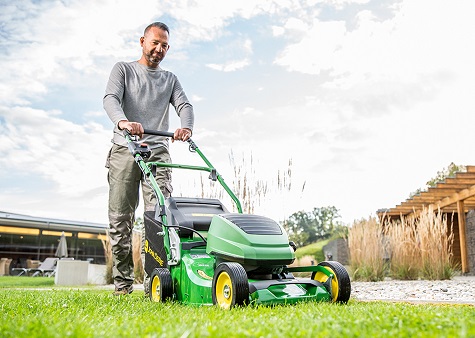
Alongside the end of production of the SABO-built, John Deere branded walk-behind rotary mowers (both commerical and domestic models), will be an end of manufacture of both John Deere Tango and SABO brand robotic mowers.
The company will however, continue to sell its full range of Deere manufactured lawn tractors and zero-turn mowers to both domestic and commercial customers, as well as its walk-behind cylinder greens mowers in the worldwide golf and sports turf markets.
Any remaining John Deere dealer inventory of these SABO-built products in the UK & Ireland will be available for sale, and John Deere say they will continue to provide parts for 10 years. Deere’s dealer network will also continue to provide parts and service in any areas where SABO branded machines have been sold.
SABO, based in Gummersbach, Germany, has been a subsidiary of Deere & Company since 1991 and has approximately 125 employees.
Mutares, based in Munich, is a private equity firm that currently owns 13 companies in the automotive and mobility, engineering and technology, and goods and services industries.
SABO will maintain ownership of its brand assets and its operations in Gummersbach. The company will continue to produce walk-behind lawnmowers and handheld outdoor power products, marketing those machines through its existing network of more than 1100 dealers in Germany, Austria, Belgium, the Netherlands, Slovakia and Switzerland.
According to Deere and Mutares, employees, customers, suppliers, dealers and distributors should notice little change in daily operations.
Tim Merrett, John Deere’s vice president, Turf and Compact Utility platform, said, “SABO is a leading brand for high quality walk-behind mowers and handheld power products in Europe, and the company is well positioned for growth with its line of battery-powered machines.
“However, Deere is shifting its focus to key production systems that will allow our machine technology to be a differentiator. Further investment in walk-behind lawnmowers was no longer a strategic fit for our global business.
“Deere is not exiting the turf care business. John Deere will continue to produce a wide range of lawn and grounds care equipment for residential, commercial and golf course maintenance use."
 |  |
GOVERNMENT MUST RECOGNISE IMPORTANCE OF AMENITY MANAGEMENT
Says Amenity Forum
Professor John Moverley OBE, has sought proper recognition by all sectors of government and opposition parties of the importance of amenity management.
Speaking recently, the chairman of the Amenity Forum, Professor John Moverley OBE, sought proper recognition by all sectors of government and opposition parties of the importance of amenity management.
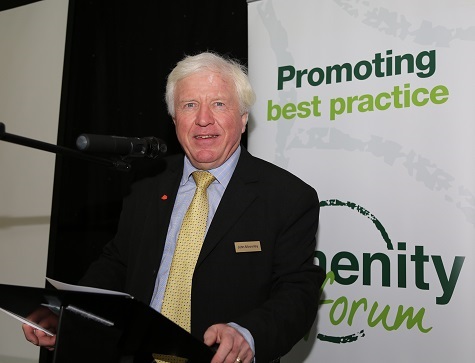
Professor John Moverley OBE
He said, "What happens in amenity management impacts on everyone in the UK every day ensuring clean, healthy and sustainable amenity and sports surfaces fit for purpose. The current health crisis has brought to the fore just how important this work is and, throughout the lockdown, staff engaged in the sector have continued to ensure safe, clean streets and pavements, essential transport networks, parks safe for use and more. Amenity can often gain the status of a forgotten industry but it is essential and will be continue to be key to recovery over the months ahead."
Defra are currently undertaking a review of the National Action Plan which sets regulations and targets for weed, pest and disease management in a professional setting. This work was previously led by a department within HSE. John emphasises that this increases the need for our voice to be heard as many new people are engaged in the process.
John went on to say, "We have welcomed engagement in a number of consultations with Defra recently and will continue to provide active support. We recognise that often the focus is on agriculture but amenity is an essential element in all of this. Amenity management does not just happen but is undertaken by trained professionals using integrated approaches making use of all tools available to produce optimum results - safe, healthy, environmentally responsible and fit for purpose."
The Forum is urging all engaged in the sector to get involved, speak to their MPs, councilors and other key stakeholders and to do it now.
John said, "The Forum has worked closely with all national governments over the last 10 years and is proud of its record both in helping achieve targets set and bringing the sector together to meet national objectives. The sector undertakes an essential role and is vital to the running of the nations of the UK."
The Forum is holding its annual conference on October 15th in Northamptonshire where the theme will be 'Planning for the Future'. The event will also be open to online delegates.
The Forum has confirmed that an address will be included from a senior government representative. For details contact Admin@amenityforum.net
 |  |
EDUCATIONAL SCHOLARSHIP OPPORTUNITY AVAILABLE
For BIGGA members
BIGGA members are being invited to apply for an education scholarship, supported by ICL.
With the BIGGA Turf Management Exhibition and Continue to Learn due to go ahead next January, members of the British & International Golf Greenkeepers Association are being invited to apply for an education scholarship, supported by ICL.
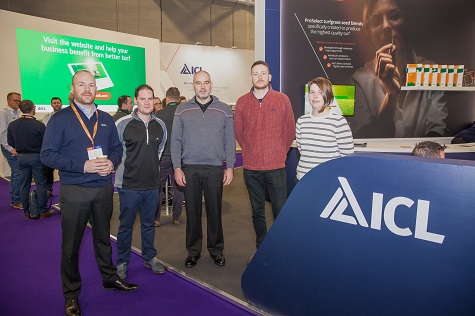
The 2020 ICL Scholars at BTME last January alongside ICL's Ed Carter (left)
With plans underway to host Continue to Learn in Harrogate next January, five BIGGA members from across the UK will be selected to become ICL Continue to Learn 2021 scholars. The successful applicants will receive three nights’ hotel accommodation and 15 hours of training and personal development at the Continue to Learn education programme, supported by BIGGA Partner and specialty fertiliser company ICL.
In the event that ongoing restrictions prevent the hosting of the event, BIGGA say Continue to Learn will become a virtual learning experience and the scholars will receive an equivalent award, including personal development opportunities amounting to the same monetary value.
BIGGA’s head of member development, Sami Strutt, said, “BIGGA is progressing with its plans to host BTME and Continue to Learn as normal and that means fantastic opportunities such as the ICL Scholarship will return.
“BIGGA and ICL understand that finances are tight due to everything that has happened this year and that’s what makes initiatives such as the ICL Scholarship even more important. Things will get better and the scholarship is an opportunity to make sure you’re ready to take the next step when the opportunity presents itself.”
The deadline for applications is Friday 31 July 2020.
 |  |
NICK BROWN JOINS CAMPEYS
Former Ransomes corporate account manager
Campey Turf Care Systems has appointed well known industry figure, Nick Brown, as their new export sales manager.
Campey Turf Care Systems has appointed well known industry figure, Nick Brown, as their new export sales manager.
Nick has over 20-years of experience in golf, and sports turf and through his previous role at Ransomes Jacobsen has extensive knowledge of the international markets. His understanding of these areas doesn’t only come from work. Four generations of his family were born and worked in the Far East, and he has lived in Australia, Malaysia, Singapore and predominantly Indonesia across 25 years.
Campey say his experience in this part of the world, in particular his knowledge of local cultures, makes him exceptionally well suited to the role.
Nick said, “In my new role, I want to build on the consistent and well-known message that Campey is always willing to go the extra mile to help. I have always worked on the basis of ‘making a customer, not a sale,’ and that matches perfectly with the common goals and message the Campey team has.
Nick joins Campey during a challenging time for global travel and distribution, but Campey chairman, Richard Campey, believes Nick’s knowledge and enthusiasm will bring a fresh approach to the situation.
Richard said of Nick's appointment, “He joins us at a time of constant change in terms of global travel, in particular the restrictions we have to work with while still providing the best service to our customers. With support from our director Lee Morgado, who is already well-known to our dealer network and end users from the middle east to Australasia we hope to continue to grow in these established and new markets. That will require a different approach in terms of connecting with our export markets, and I’ve got no doubt that Nick will take that challenge on with enthusiasm.”
 |  |
MST SECURE ISEKI FLEET DEAL FOR BLUNDELL'S
Range of machinery for school
Iseki UK & Ireland, alongside their local dealer MST based in Tiverton, recently sold a fleet of machinery into Blundell’s School in Devon.
Iseki UK & Ireland, alongside their local dealer MST based in Tiverton, recently sold a fleet of machinery into Blundell’s School in Devon.
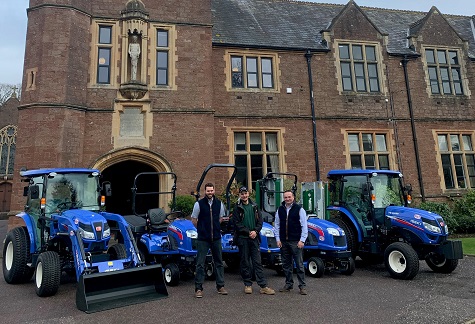
L-R: Scott Struthers (MST sales rep), Graham Cox (Blundells) and John Clifford (ISEKI sales manager)
Newly appointed Graham Cox at Blundell’s in Tiverton had been tasked with upgrading the groundcare fleet of machinery. So, following on from what his estate bursar Ian Barnes, deputy head groundsperson Richard Hutchings and the grounds team had started, Graham began looking into what was on the market. Having contacted a number of local dealers Iseki and MST came up trumps for their needs.
Graham explained, "We knew our two previous 36hp tractors needed an increase in power to 50hp in order to run the specialist sports turf equipment around the site. The schools overall strategy is to significantly improve its sports pitches and gardens. MST brought out the Iseki TG6495 IQ on demo for us to try and it was perfect for the jobs we require."
Blundells also required new ride-on mowers for their gardens and fine turf areas, opting for the SXG323 model.
The deal also included a TXGS24 23hp tractor which is used on the astroturf pitches and for running the SISIS Quadraplay on sports pitches.
"We had a large range of demos and competitor quotes but MST made the decision simple," said Graham.
"We have been very lucky, the school has supported the grounds department to enable us to produce top quality playing surfaces and grounds maintenance across the site with the best equipment. The purchase will pay off for years to come with continued improvement of presentation at the school."
 |  |
GGM COMPLETE CHARITABLE CHALLENGE
Raised over £3000 so far
Final walk element of event last weekend saw the team take 80,000 steps through blistering temperatures and torrential rain.
Last Saturday members of the GGM team, including md Chris Gibson, concluded their 100 mile round trip cycle and walk for their chosen charities, Greenfingers, St John’s Hospice in Lancaster and Pendleside Hospice in Burnley.
Having raised over £3000 so far, they have already smashed their original £1000 target.
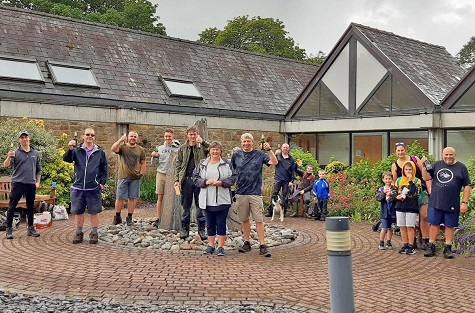
Chris, Hillary and Thomas Gibson with the rest of the team in family groups at St John’s Hospice
The final part of the challenge which was completed last Saturday afternoon (June 27th) was the walking element, which covered over 80,000 steps, taking in the Lancashire Witches Walk which passes through the Forest of Pendle and the Forest of Bowland to finish at Lancaster Castle. Travelling through blistering temperatures and torrential rain, the team completed their walk, arriving at St John’s Hospice, Lancaster to a hero’s welcome and an afternoon tea with a well-earned beer and fizz.
Chris Gibson concluded, “I am hugely proud of what our staff have achieved this weekend. It was teamwork in the truest sense, and we all worked hard to make the event work, while adhering to social distancing. The youngest participants were just seven years old and as a family business, and it was fantastic for us all to come together.
"We’d like to extend our thanks to Chorley Nissan who loaned us a support vehicle and Lisa and the team at St John’s Hospice who waved us off and then welcomed us back with refreshments.
You can still donate by clicking here.
 |
|
 |  |
ADVERTISE YOUR JOBS HERE
Amazing success rates!
Advertise your recruitment needs on TurfPro Weekly Briefing and reach our targeted audience of recipients every week.
Contact Nikki Harrison for details - 01491 837117
|
 |  |
TACKLE ANY TASK WITH THE STIHL CORDLESS KOMBIENGINE
STIHL KMA 130 R KombiEngine
As the lightest in it’s range, the STIHL KMA 130 R KombiEngine is compatible with the wide range of STIHL KombiTools, providing professionals with a powerful and multi-functional tool.
As the lightest in its range, the STIHL KMA 130 R KombiEngine is compatible with the wide range of STIHL KombiTools, providing professionals with a powerful and multi-functional tool.
Weighing only 3.2kg for the powerhead and shaft, the cordless KMA 130 R delivers high torque, low vibration and is 800 grams lighter than its petrol alternative (KM 94 RC-E).
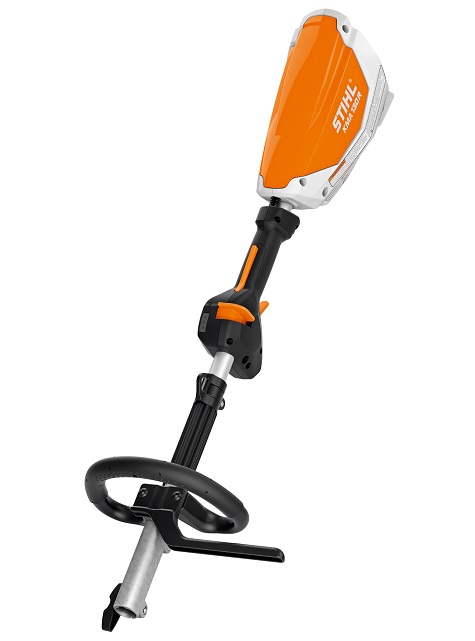
STIHL KMA 130 R KombiEngine
Used in conjunction with STIHL’s AP range of batteries, including the AR backpack batteries, the KMA 130 R utilises three power levels to enhance energy efficiency. The quiet running nature of the KombiEngine is ideally suited to work in applications in noise-sensitive areas and can be comfortably used for a prolonged periods of time due to its low vibration levels.
The KMA 130 R is compatible with STIHL’s range of Kombi attachments, including the HT-KM pole pruner, HL-KM 0o hedge trimmer, HL-KM 145o hedge trimmer and FH-KM 145o scrub cutter, all of which have been enhanced to reduce the overall weight of the tool and are suited for domestic and professional use. Other attachments include the FS-KM lawn trimmer, MB-KM grass cutting blade, KB-KM bristle brush, FCB-KM edge trimmer, FCS-KM straight shaft edge trimmer, BG-KM blower, BF-KM pick tine and RG-KM rotary cutting head.
For more information on the KMA 130 R or STIHL’s extensive range of cordless machinery, please visit www.stihl.co.uk
 |
|
 |  |
 |  |
 |  |
 |  |
 |  |
AUTUMN DISEASE MANAGEMENT
The coming months are going to prove very difficult
by David Howells, regional manager (north), Headland Amenity
As we start looking ahead to the autumn, putting in place maintenance schedules and course management planning, we need to maximise every pound spent in terms of best value for the golf course.
2020, a year for contemplation. A period of isolation gave us the time to slow down and possibly think of our past successes and future goals.
This summer I was supposed to be in Blandford celebrating the 100th anniversary of The Royal Signals, a corps I proudly served in during the early 1980s along with my father, who now aged 82, was a sergeant major in the same unit. Unfortunately, the celebrations will not be taking place this year but hopefully me and my dad will get down to Dorset very soon.
My career in the army allowed me to serve in Denmark, Falkland Islands, Belize and with The United Nations in Cyprus. During my last tour in Nicosia was when I met with my OC to tell him I planned to leave the army and move into greenkeeping in my hometown of Harrogate. His response was to disagree with my decision and many questions were asked from my superiors, who were also friends of my dad but my mind was made up and so a few months later I was returning to ‘civvy street’ and into the world of greenkeeping under my friend, mentor and long since retired, Tony Baxby - head greenkeeper at Harrogate Golf Club.

Mount Maria, Falkland Islands. I spent 4 weeks living up there, dismantling a rebro site and ammunition clearance. It was a very cold experience!
As the ‘older’ turfies out there will know, the years go by very quickly! And now I find myself having worked for over thirty years in the industry both as greenkeeper, course manager and in technical sales.
From my early experiences as greenkeeper at Harrogate Golf Club and in Munich to a new golf course construction and course manager at The Shropshire to the present day working at Headland Amenity, I have certainly seen the changes within the industry - from products available, machinery, technology & course management techniques.
The past few years have really seen some difficult times within the golf industry, mainly from budget restraints, withdrawal of chemicals and of course, the good old British weather with the ultimate word being ‘extremes’.
Undoubtedly, the coming months are going to prove very difficult for golf course managers, with most likely even tighter budget restraints during the financial fallout from the summer of this year. But with green shoots of golfers returning after lockdown and a fresh eagerness to get playing sports in the open air, hopefully golf will get a much-needed boost.
Planning ahead
As we start looking ahead to the autumn putting in place maintenance schedules and course management planning, we need to maximise every pound spent in terms of best value for the golf course. One issue that has changed drastically over the years, is that of disease management. With the loss of many fungicide active ingredients, the days of ‘firefighting’ with Iprodione and other contact fungicides have long gone, (along with the conversations over a pint of beer on a cold January evening in Harrogate, ‘how many times you sprayed this winter?) A new approach is needed.

Though withdrawal of fungicide products has been a regular occurrence over the years, mainly due to changing legislation, there have been a variety of products still available to turf managers. The latest withdrawals have been sudden, leaving fewer options and disease management has required a totally different way of thinking, especially in terms of managing Microdochium nivale.
A positive response to this situation has emerged. Companies within the industry have worked very hard and spent a lot of money on research to develop solutions to manage disease, especially utilising a non-fungicidal approach.
Within Headland Amenity, fourteen years work has now gone into initial pioneering research both independently and at the S.T.R.I to where we currently stand in our non-fungicidal disease management strategy.
The team at Headland all carry a ‘Green Bible’ which details all the annual data from the trial-work we have concluded over the last fourteen years - from research findings within fungicide resistance screening through to the present tank mix solution of 20-20-30 plus Mantle mix.
The whole concept of the 20-20-30 mix has taken many years of trial-work and tweaks along the journey, to achieve the success that many turf managers are now seeing in drastically reduced incidence of Microdochium nivale in their playing surfaces.
Each product, whether a plant elicitor or protectant and the components within, have a specific role in helping to reduce any potential disease activity.
The ‘20-20-30’ name comes from the application rate per hectare of the given products, - 20L Turfite Elite, 20L Liquid Turf Hardener and 30L Seamac Proturf.
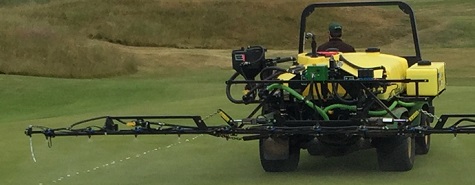
There are many variations available within the turf industry now, but they are not all the same! Just like when purchasing your fertiliser, it is not just about the analysis of the fertiliser (the numbers on the bag) you want to know what the make-up of that given fertiliser is. What is the nitrogen and potassium source? What is the fast start portion? etc. These are the type of questions you ask for fertiliser and the same should go with a non-fungicidal package you are looking to use.
What are the benefits to applying phosphite? What iron do you suggest? What application rates, what quantity of nutrient does that put down? What is the longevity? At what intervals should I spray? These are the questions I would want answers to in selecting any autumn disease management products along with written data on the trial work carried out and specific statements. The Headland Amenity ‘Green Bible’ shows detailed data and trial-work going back fourteen years.
The three liquid products all have unique features that distinguish them from other formulations. Together they become part of a strategic approach to turf management, led by research and practical evaluation, which most importantly comes from the turf manager in their feedback on the results they have achieved in a percentage reduction of Microdochium nivale activity within their playing sward.
Ingredients
So, what are the 3 products of 20-20-30? It contains phosphite you say, is this a fungicide?
Firstly, we look at Turfite Elite, which is a potassium phosphite based formulation with added salicylic acid. Is it a fungicide? In short, NO. Turfite Elite is absorbed when applied through the upper and lower surface of the grass plant leaf which then creates a physiological plant response. In turn, the salicylic acid triggers the plants own natural defence mechanism, known as SAR – Systemic Acquired Resistance. The phosphite acts as a biostimulant, encouraging the plant to increase its ability to grow away from plant pathogens and/or plant stress situations, improving plant health and in turn, lowering susceptibility to disease. Research supporting the biostimulant mode of action of phosphite has recently been published in the UK and Germany and will feature in a forthcoming technical article produced by Mark Hunt, Technical Director at Headland Amenity.
The other two products, Liquid Turf Hardener and Seamac Proturf, are both plant protectants. Supplied calcium and magnesium are quickly taken up by the plant in their nitrate forms, even at low air and soil temperatures. This increases the efficacy of the cell wall and thereby makes it harder for a pathogen to enter the grass plant. The foliar iron can decrease the moisture level on the plant leaf surface as well as lower the pH to help discourage pathogenic fungal growth. Trials results in the field and also in the laboratory have shown Seamac Proturf Fe provides the optimum iron formulation for suppression of Michrodochium nivale.
To enhance the package of 20-20-30 even further, we also now suggest adding Mantle, a water-soluble manganese, zinc, magnesium and Harpin Protein Elicitor combination, also giving assistance to the fundamental processes of both photosynthesis and protein synthesis, that contribute to a healthy plant.
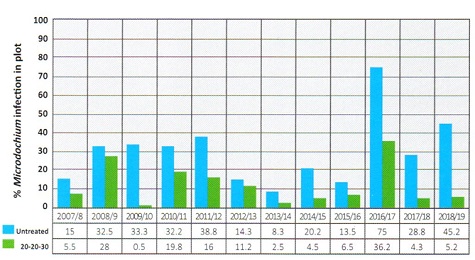
The above graph, highlights the success from 2017 in supplementing the 20-20-30 mix with 20kg per hectare of Mantle. An effective IPM program against Microdochium nivale, utilises the 20-20-30+Mantle tankmix, starting your first application during September, followed by frequent applications at 14-28 day intervals depending on the month and disease pressure to help prevent a population establishing during the autumn/winter.
Of course, managing Microdochium nivale requires many other aspects within the turf managers tool box, non-pesticidal treatments in combination with correct timing and application of approved fungicides & good greenkeeping practices.
The good old British weather, with its extremities has a lot to answer for. As part of our service to assist turf managers, we provide a link to weather information specific to their location, along with the weekly weatherblog written by Mark Hunt which you can subscribe to at weather@headlandamenity.com This gives very useful information not only on the weather for the week ahead but important agronomic advice along with any possible disease issues for the coming days.
Climatic conditions, particularly temperature and humidity are a big factor in driving Microdochium nivale activity and the management of both dew and guttation fluid are a necessity in autumn disease management.
As we move into the autumn with lower temperature and evapotranspiration, the plant leaf dries very slowly, sometimes staying wet for the whole 24-hour period. It is a well-proven fact that elevated humidity is a driver for increased Microdochium nivale activity. So, when considering the order in which the greens are cleared of dew in the mornings, problematic greens should be addressed first in the dispersal of any leaf dampness.
To help disperse dew, we would suggest the use of DewCure, which works to reduce leaf moisture, suppressing both dew and guttation fluid.
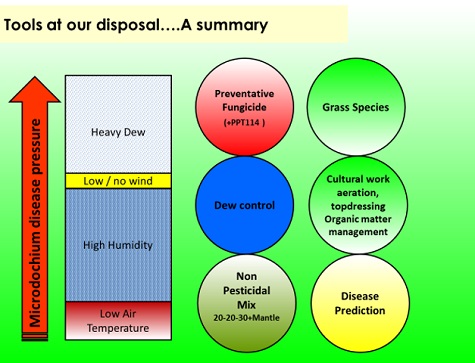
If you would like further information on the Headland Amenity approach to autumn disease management please email info@headlandamenity.com where a Headland manager specific to your location can assist you in working together in planning your disease management programme.
As my old Corp motto goes ‘Certa Cito’ our response will be ‘Swift and Sure’
David Howells
Regional manager (north)
Headland Amenity
 |
|
|
|